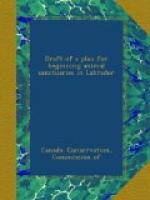Dear Colonel Wood,
I have been reading with the greatest interest your address on Animal Sanctuaries in Labrador and also the draft of the Supplement which you were good enough to send me for perusal. You have certainly been so far rewarded for your trouble by having collected a great weight of testimony and of valuable opinions, all endorsing the useful cause to which you are devoting yourself.
I know from reports that many varieties of game, which were threatened with extinction in South Africa ten years ago, have, by the timely establishment of game reserves, been saved, and are now relatively numerous. I may add that this end has not been obtained simply by the establishment of the reserves and by the passing of game-laws, but by enforcing those laws in the most rigid manner and by appointing the right men to enforce them.
From personal experience I know what the game reserves have done for East Africa. In these reserves the wild animals are left to breed and live in peace, undisturbed by any one but the game-warden. From them the overflow drifts out into the surrounding districts and provides a plentiful supply for the hunter and settler. What has been done in Africa could be done in Canada and elsewhere. You have so much land which is favourable to birds and beasts, though unfavourable to the settler, that it would seem to be no hardship to give up a suitable area or areas for the purpose of a reserve. This, with the infliction of heavy penalties for the ruthless destruction of animal life, should secure a fresh lease of existence for the various species whose extermination now appears to be imminent.
Please accept my best
wishes for the success of your
work, in which you may
always count upon my greatest
sympathy.
Believe me,
Yours truly,
ARTHUR.
II. VERIFICATION.
In order to make quite sure about conditions up to date, I spent two months last summer examining some 1500 miles of coast line, from Nova Scotia, round by Newfoundland to the Straits, and thence inwards along the Canadian Labrador and North Shore of the St. Lawrence. On the whole, I found that I had rather under- than over-stated the dangers threatening the wild life there, and that I had nothing to retract from what I said in my Address and Supplement.
As I spent one month among the fishermen of Nova Scotia and Newfoundland, who commit most of the depredations, and the other month among the people along the Canadian Labrador, on whom the depredations are committed, I enjoyed the advantage of hearing both sides of the story. It was very much what I had heard before and what I said it was. The argument is, that so long as there is no law, or no law put in force, every man will do what he likes—which is unanswerably true. I am also afraid that there is no practical answer to the logical deduction from this, that so long as bad men can do what they like good men must do the same or “get left”. Good, bad and indifferent, all alike, are squandering the capital of the wild life as fast as they can, though the legitimate interest of it would soon yield far better returns if conservation was to replace the beggaring methods in vogue to-day.




